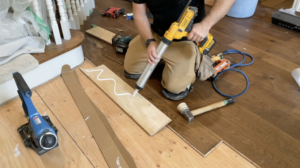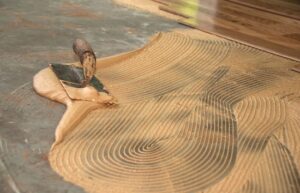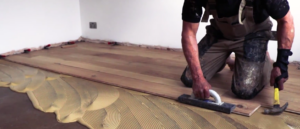Should I Glue My Hardwood Flooring to The Subfloor?
Posted: January 22, 2024Click here to view our extensive line of sustainable hardwood floors.
Click here to receive a delivered price to your project.
________________________________________________________________________________________________________________________________________________

Author – Ryan Palma Owner/CEO Sustainable Lumber Co.
Factors to Consider Before Gluing Hardwood Floors
Deciding whether or not to glue hardwood flooring—either alone or in combination with nailing—depends on several factors, including the type of hardwood, subfloor conditions, plank width, and project-specific requirements. Here are key considerations before gluing a hardwood floor to a subfloor:
- Hardwood Type: The suitability of gluing down hardwood flooring depends on the type of hardwood you’re working with. For example, thin engineered hardwood (typically 1/2″ thick or less) is often a prime candidate for glue-down installation due to its minimal wear layer and slim plywood core. Solid hardwoods like our rustic Hickory flooring, which are from a less stable wood species, are also a good candidate compared to a more stable wood species like our Douglas Fir wood floors.
- Subfloor Conditions: The choice of installation method is significantly influenced by the type and condition of your subfloor. Typically, gluing hardwood flooring is well-suited for concrete or plywood subfloors. To prevent squeaks and ensure a secure bond, the subfloor must be clean, level, and dry.
- Width Considerations: The width of a hardwood floor is also important to consider. Typically wider widths, depending on species, can benefit from a glue assist installation since they are more susceptible to movement. This also helps with the inevitable squeaks that can occur over time.
 Moisture Resistance: A full trowel glue down using a mastic glue can create a moisture barrier which is ideal for spaces with high humidity or moisture concerns. Wider planks should be acclimated to the environment and can benefit from added adhesive to counteract potential cupping and movement.
Moisture Resistance: A full trowel glue down using a mastic glue can create a moisture barrier which is ideal for spaces with high humidity or moisture concerns. Wider planks should be acclimated to the environment and can benefit from added adhesive to counteract potential cupping and movement.
Benefits of Gluing Hardwood Floors
- Acoustic Advantages: Gluing down hardwood flooring can improve sound insulation and reduce noise, which is crucial in multi-story buildings or areas where sound control is a priority.
- Warranty and Manufacturer Guidance: Always adhere to the manufacturer’s installation recommendations, which may specify the preferred installation method and plank widths for their particular product. Following these guidelines is essential for both warranty compliance and long-term floor stability.
- Skill and Experience: Proper adhesive application is essential for successful glue-down installations. When working with wider planks, extra care must be taken to ensure an even spread of adhesive to prevent cupping and gaps. Experience installers are better equipped to handle the nuances of wide plank gluing.
- Budget Considerations: It’s important to acknowledge that gluing down hardwood flooring, especially wider planks, may require more adhesive and labor, thus impacting the overall project budget. However, the investment is often justified by the durability and stability of the floor.
When to Combine Gluing with Other Installation Methods

Before gluing hardwood flooring to a subfloor, always consult the manufacturer’s guidelines. If necessary, seek advice from a professional hardwood flooring installer who can assess your specific conditions and recommend the most suitable installation method.
Contact Us for Expert Advice
Our knowledgeable and educated staff is here to answer any additional questions you may have. Please call us today for a free quote on our sustainable wood flooring: Ph# 406.642.7120 or click here to submit an inquiry online. We look forward to working with you on your next project!

